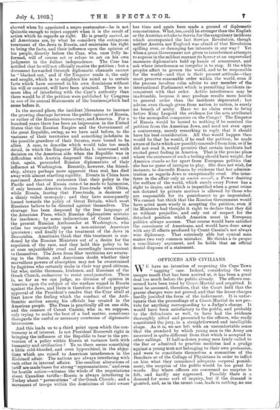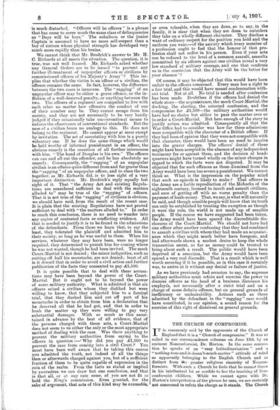OFFICERS AND CIVILIANS.
WE have no intention of reopening the Cape Town " ragging " case. Indeed, considering the very meagre result that has been arrived at, it has been a great deal too much before the public already. The officers con- cerned have been tried by Court-Martial and acquitted. It must be assumed, therefore, that the Court held that the graver charges were not proved, and that the lesser charges hardly justified the form of the indictment. It is unfor- tunate that the proceedings of a Court-Martial do not pro- vide for anything corresponding to a Judge's charge. It would have been satisfactory to the public, and probably to the defendants as well, to have had the evidence thoroughly sifted and presented to the officers, who really constituted the jury, in a straightforward and intelligible shape. As it is, we are left with an uncomfortable sense that the standard by which young men in the Army are measured is quite different from that which is accepted in other callings. If half-a-dozen young men lately called to the Bar or admitted to practise medicine had a grudge against a young man not belonging to their own profession, and were to constitute themselves a committee of the Beuchers or of the College of Physicians in order to inflict on him what they considered adequate corporal punish- ment, the surprise of the public would be too great for words. But where officers are concerned no surprise is felt, and hardly any expressed. Possibly there is a demand for some sort of inquiry, but if the demand is granted, and, as in the recent case, leads to nothing, no one is much disturbed. "Officers will be officers" is a phrase that has come to cover much the same class of delinquencies as "Boys will be boys." The subaltern or the junior Captain is assumed to have no more self-respect than a boy of sixteen whose physical strength has developed very much more rapidly than his brains.
We cannot think that Mr. Brodrick's answer to Mr. H. C. Richards at all meets the situation. The question, it is true, was not well framed. Mr. Richards asked whether any General Orders are to be issued "to prevent any further ill-treatment of unpopular officers or civilians by commissioned officers of his Majesty's Army"? This im- plies that whether the victim is an officer or a civilian, the offence remains the same. In fact, however, the difference between the two cases is immense. The " ragging " of an unpopular officer may be either a grave offence, or the in- fliction of a well-deserved penalty, or anything between the two. The officers of a regiment are compelled to live with each other no matter how offensive the conduct of one of their number may be. They cannot escape from his society, and they are not necessarily to be very hardly judged if they occasionally take unconventional means to enforce the observance of conventional standards. But the case of a civilian bears no analogy to this. He does not belong to the regiment. He cannot appear at mess except by invitation. The act of associating with him is a purely voluntary one. If he does the same things which would be held worthy of informal punishment in an officer, the obvious remedy is the cessation of all further intercourse with him. "The hand of Douglas is his own." The officers can one and all cut the offender, and he has absolutely no remedy. Consequently, the " ragging " of an unpopular civilian is an offence quite different from and far graver than the " ragging " of an unpopular officer, and to class the two together, as Mr. Richards did, is to lose sight of a very important distinction. Mr. Brodrick's reply equally lost sight of it. That "the Army Act and existing Regula- tions are considered sufficient to deal with the matters alluded to" may be true of the "ragging" of officers.
That it is not true of the "ragging" of civilians is obvious, we should have said, from the result of the recent case.
It is plain that the existing Regulations have not proved sufficient to deal with "the matters alluded to." In order to reach this conclusion, there is no need to wander into any region of contested facts or conflicting evidence. All that is needed to justify it is to be found in the admissions of the defendants. From these we learn that, to say the least, they tolerated the plaintiff and admitted him to their society, so long as he was useful to them. 'When his services, whatever they may have been, were no longer required, they determined to punish him for coming where he was not wanted, though he had been invited. The mock Court-Martial is not denied ; the minor indignities, such as cutting off half his moustache, are not denied ; least of all is it denied that in order to avoid a civil action and further publication of the facts they consented to pay .21,500.
It is quite possible that to deal with these accusa- tions may have been beyond the power of the Court- Martial. But it ought not to be beyond the power of some military authority. What is admitted is that six officers seized a civilian whom they disliked but were willing to know, that they subjected him to a farcical trial, that they ducked him and cut off part of his moustache in order to obtain from him a declaration that he deserved all that he had got, and that in order to hush the matter up they were willing to pay very substantial damages. With so much as this ascer- tained in advance by the best of all evidence, that of the persons charged with these acts, a Court-Martial does not seem to us either the only or the most appropriate method of dealing with the case. Was there anything to prevent the military authorities from saying to the officers in question :—‘ Why did you pay .21,500 to prevent the case from coming into a civil Court ? You must have been well aware that by taking this course you admitted the truth, not indeed of all the things then or afterwards charged against you, but of a sufficient fraction of them to be quite capable of expression in the coin of the realm. From the facts as stated or implied by yourselves we can draw but one conclusion, and that is that all, or at any rate some, of you are not fit to hold the King's commission. Even granted, for the sake of argument, that acts of this kind may be excusable, or even tolerable, when they are done, so to say, in the family, it is clear that when they are done to outsiders they take on a wholly different character. They disclose a want of ordinary respect for the position you hold and the uniform you wear,—of the anxiety which every member of a profession ought to feel that the honour of that pro- fession shall not suffer in his person. Even if your acts can be reduced to the level of a common assault, assaults committed by six officers against one civilian reveal-a very low standard of military courage, and one that confirms us in the conviction that the Army will be the better for your absence ' ?
Of course, it may be objected that this would have been unfair to the officers concerned. Every man has a right to a fair trial, and this would have meant condemnation with- out trial. Not at all. No trial is needed after confession has been made. Doubtless if the officers had denied the whole story—the acquaintance, the mock Court-Martial, the ducking, the shaving, the extorted confession, and the compromise for .21,500—the military authorities would have had no choice but either to pass the matter over or to order a Court-Martial. But here enough of the story to justify action was admitted. Consequently all that the War Office had to consider was how far these admissions were compatible with the character of a British officer. If they had been of opinion that they were not compatible with that character, there would have been no need to inquire into the graver charges. The officers' denial of these might have been accepted in the absence of any independent testimony for or against them, and the decision at head- quarters might have turned wholly on the minor charges in regard to which the facts were not disputed. It may be objected that for such offences as these dismissal from the Army would have been too severe a punishment. We cannot think so. What is the impresSion on the popular mind that such an episode is likely to make ? That officers in the Army are a feeble reproduction of the Mohocks of the eighteenth century, licensed to insult and assault civilians, and sure of getting off with no worse penalty than the payment of hush-money. That, we say, is what will naturally be said, and though sensible people will know that its truth can only be established by treating the exception as though it were the rule, the world is not made up of sensible people. If the course we have suggested had been taken, the Army would have been spared the discreditable dis- closures of the Court-Martial. We should not have had one officer after another confessing that they had combined to assault a civilian with whom they had made an acquaint- ance which they might much better have foregone, and had afterwards shown a modest desire to keep the whole transaction secret, so far as money could be trusted to bring about such a result. The public would have been deprived of a sensation, but the Army would have been spared a very real discredit. That is a result which is well worth securing if it be possible, as in this case it certainly was, to arrive at it without any denial or failure of justice.
As we have previously had occasion to say, the supreme military authorities must retain and, exercise the power to dismiss officers as the head of a business dismisses his employs, not necessarily after a strict trial and on a charge of some definite offence, but on general grounds of inefficiency or undesirability. Actions such as those admitted by the defendant in the " ragging " case would have constituted, in our opinion, a sound reason for the exercise of this right of dismissal on general grounds.











































 Previous page
Previous page